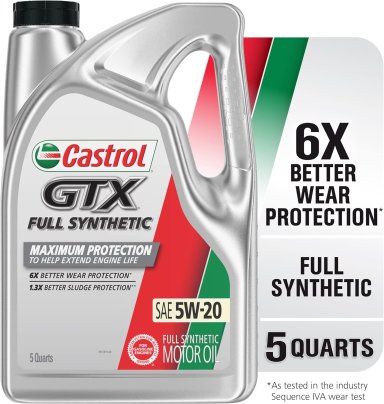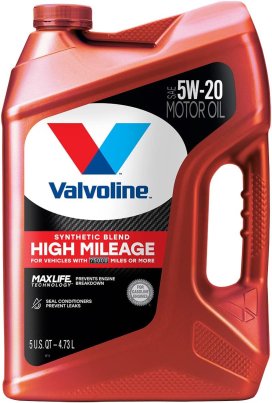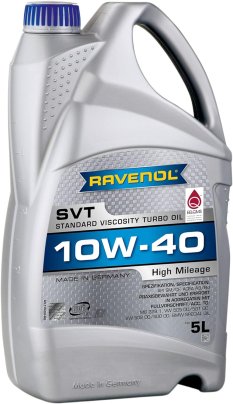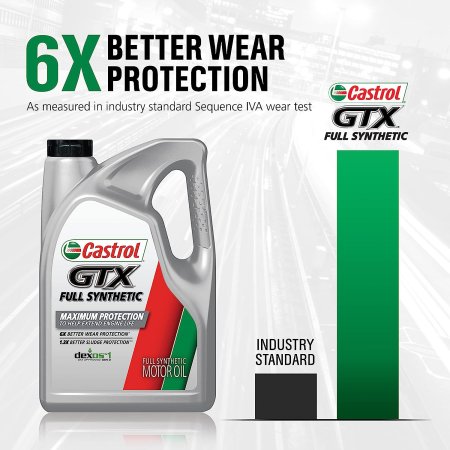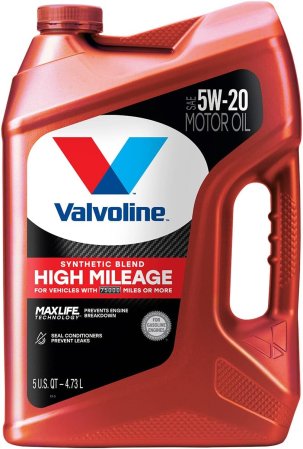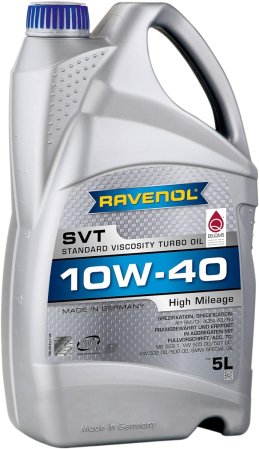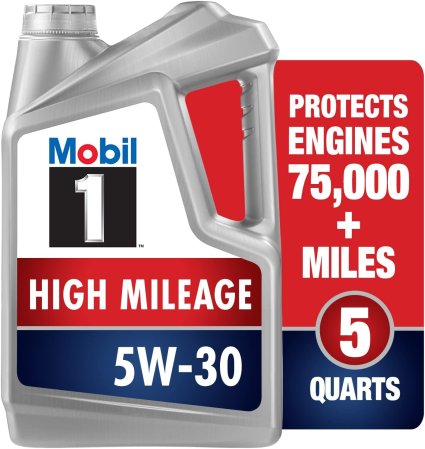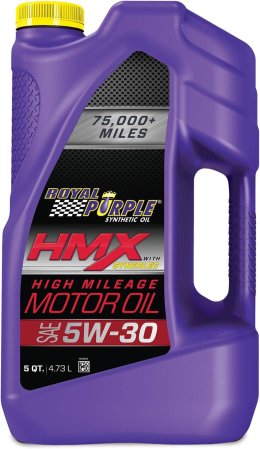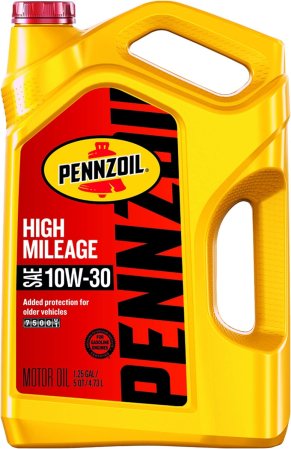We may earn revenue from the products available on this page and participate in affiliate programs. Learn more ›
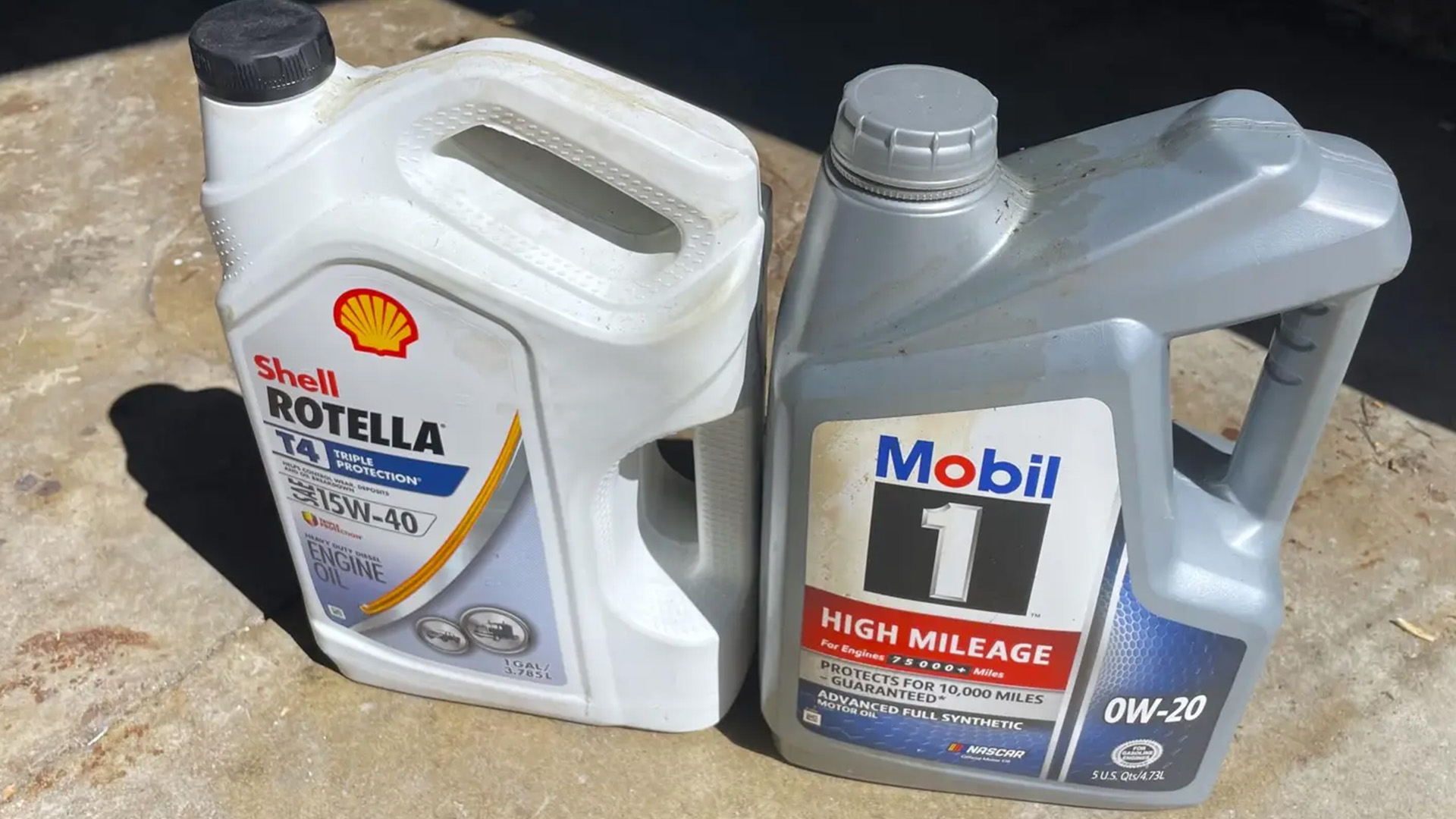
As the single most important fluid in any internal combustion engine—even that mystical rotary business—running the right oil is paramount. It handles so many tasks. Like lubricating crucial components, actuating variable valve timing, and even helping keep the engine cool in some cases. Folks call it the lifeblood of the engine for a reason.
Using a quality oil that’ll help sustain an engine as it starts to be deemed high mileage is a good idea, too. Once an engine approaches 100,000 miles—or even as little as 75,000 miles—it’s common for seals to wear out, tolerances to open up, oil flow to decrease a little, and so on. Especially if it hasn’t had its oil changed religiously at every manufacturer’s recommended interval—or sooner. High-mileage-specific is chock-full of unique formulas that help keep the engine’s insides clean. They also re-condition seals, resist burn, and possess other quality-of-life boosting benefits.
We’ve assembled a handy and thorough guide of the best high-mileage engine oils on sale; utilize it for your next change.
Summary List
- Best Overall: Castrol GTX Full Synthetic Motor Oil
- Best Value: Valvoline High Mileage with MaxLife Technology Synthetic Blend Motor Oil
- Best Premium: Ravenol SVT 10W-40 High Mileage Semi-Synthetic Motor Oil
- Honorable Mention: Mobil 1 High Mileage Full Synthetic Motor Oil
- Honorable Mention: Royal Purple HMX High-Mileage Synthetic Motor Oil
- Honorable Mention: Pennzoil High Mileage Conventional Motor Oil
Our Methodology
While we wish we had the time and equipment necessary to long-term test every single one of these oils, unfortunately, we don’t. This is just a buyer’s guide, but look forward to comprehensive multi-product testing in the near future. Utilizing our familiarity and experience with the brands of these specific engine oils, we weighed out each one for its cost versus its detergent content, type, weight (also known as its viscosity) availability, and other meaningful metrics. All are quality oils, but some will play with your car’s engine better than others, whereas some are more universal. For more on our methodology, check this out.
The Best High-Mileage Engine Oils Recommendations & Reviews
Best Overall
Castrol GTX Full Synthetic Motor Oil
Pros
- Excellent anti-wear formula
- Packed with cleaning detergents
- Full-synthetic thermal stability
- Anti-sludge properties keep the inside of your engine clean
Cons
- Low weight variety
- Full-synthetic formula won’t play well with truly all engines
Castrol GTX full-synthetic is a household name in the high-mileage oil game for a reason. It’s a trusted formula for optimum prevention and protection. Castrol proudly reports that it has 130 percent better sludge protection than industry standards, in fact, it’ll do its best to clean up any sludge left in the system from previous oil changes. It also possesses six times more wear protection than industry standards, and its full-synthetic formula possesses better thermal stability over semi-synthetic blends and conventional options—this means it’ll keep components well-lubricated in the face of high heat.
Best Value
Valvoline High Mileage with MaxLife Technology Synthetic Blend Motor Oil
Pros
- Meets or exceeds industry standards
- Good variety of weights
- Great price
Cons
- Synthetic blend won’t be optimum for most vehicles
Valvoline’s entry in the high-mileage oil game comes with many pluses. It features a lot of the same friction modifiers, wear reducers, seal conditioners, and sludge reducers as the other formulas in this buyer’s guide. But at a bargain price, especially up against the full-synthetic options. Therein lies the rub: Modern naturally aspirated and turbocharged engines won’t run as well on a synthetic blend. This is due to their tighter tolerances, advanced variable valve timing systems, and finely engineered turbo oil passages. But still, while it might not be the best choice for your eight-year-old BMW 330i, it might be a prime candidate for your early Aughts V8 GM truck.
Best Premium
Ravenol SVT 10W-40 High Mileage Semi-Synthetic Motor Oil
Pros
- Specially formulated for turbocharged gasoline and diesel engines
- Full of cleaning additives
- Friction and anti-wear ingredients
Cons
- Higher price
- Not much variety in weights
Raise your hand if you’ve tasked yourself with maintaining an old turbocharged Porsche, Volkswagen, BMW, Mercedes-Benz, or Audi. All by yourself. C’mon, don’t be shy; you should be awarded for your bravery. For older European cars that run better with semi-synthetic oil coursing through their veins, Germany company Ravenol offers a very high quality solution. It’s specially formulated for older turbocharged engines. This includes diesels, and has a lot of conditioners that prevent sludge, cut down on consumption, and even condition seals. Hey, anything to help any-age German engine from leaking oil.
Honorable Mention
Mobil 1 High Mileage Full Synthetic Motor Oil
Pros
- Good variety of oil weights
- Excellent internal engine heat protection
- Cleans and prevents sludge buildup
Cons
- A little higher in price
- Claimed 10,000-mile oil change might not be a good idea
Mobil 1’s entry in the ring is just as solid as any other full-synthetic. It features a laundry list of additives and detergents that protect against heat, lubricate effectively, and cut down on sludge. Though, it’s a little odd to claim it’s good for a 10,000-mile oil change interval: It might be a better idea to stick to your manufacturer’s recommended 3,000-7,500 miles (check your owner’s manual).
Honorable Mention
Royal Purple HMX High-Mileage Synthetic Motor Oil
Pros
- Fuel-economy boosting (or restoring)
- Robust mix of anti-wear ingredients
- Corrosion protection
Cons
- Price
- Small mix of available weights
Royal Purple is renowned for its high-performance, motorsports-centric oil formulas, and utilizes its experience in such a field for engines that need a bit more care in their older age. The Texas-based brand says this oil not only increases (or restores) fuel economy but is an especially solid option for turbocharged and gasoline-direct injected engines. It also has excellent wear-prevention compounds, including zinc, and protects against all forms of corrosion.
Honorable Mention
Pennzoil High Mileage Conventional 10W-30 Motor Oil
Pros
- A top conventional candidate
- Possesses plenty of seal conditioners
- Sludge prevention
- Price
Cons
- Can’t really fault this one
Pennzoil’s High Mileage conventional oil doesn’t really have any knocks against it. It has pretty much all of the ingredients that high-mileage engines benefit from, and even comes in a good variety of weights that will fit most folks’ needs. However, the main reason we included it is because it’s a sturdy conventional option: While most engines run best on synthetic, many still like conventional, more, especially if they’re a few decades old. If you’re sporting an old truck, off-roader, muscle car, or even moody Land Rover from the ’80s and early ’90s, you might prefer conventional. So, why not treat it to a conventional one that comes with all the added benefits of sludge prevention, seal conditioning, and friction modifiers?
Our Verdict
All of these oils are top-shelf, and some are a little more specific in their application than others. But for the top two most universal choices, you can’t go wrong with Castrol GTX Full Synthetic Motor Oil or Valvoline High Mileage with MaxLife Technology Synthetic Blend Motor Oil.
Features To Know
Here’s the rundown.
Oil Weight/Viscosity
To quote a previous post on The Drive, the common way that engine oils are measured and marketed in our modern era is with a two-part label outlined by The Society of Automotive Engineers (SAE): The first number is its cold startup viscosity indicated by a W (think winter), followed by a number for its hot or operating temperature viscosity. Some examples of common oil weights are 5W-30, 10W-40, 0W-30, and so on. These are known as multigrade oils.
Lower cold-start viscosity numbers are ideal for climates that see cold winter temperatures, as it ensures the most flow when ambient temperatures are immensely lower than the engine’s operating temperature. The second number is its viscosity at 100 degrees Celsius (212 degrees Fahrenheit). Thus, with a 0W-30 oil, it will act as a 30-grade oil at hot or normal operating temperatures.
FAQs
You’ve got questions. The Drive has answers.
First and foremost, let’s frame pricing in five-quart jugs, as that’s an economical and common way to buy oil.
$20-25 per five-quarter: most of the oils listed above, you really can’t go wrong.
$25-80 per five-quarter: higher-end stuff that’s usually full-synthetic, and for more specific applications. This is usually where most European oil brands land.
High-mileage oils at the very least contain a higher-than-average amount of friction modifiers, sludge cleaners and reducers, seal conditioners, and increased wear protection. As all kinds of seals start to wear down, these oils keep them in better shape. As piston rings wear down, valve tolerances increases, oil passages get a little sludge in them, oil squirters lose effectiveness, etc., high-mileage formulas work overtime to protect and improve upon all of the above.
Read your owner’s manual and figure out which oil weight/viscosity you should put in your engine.
